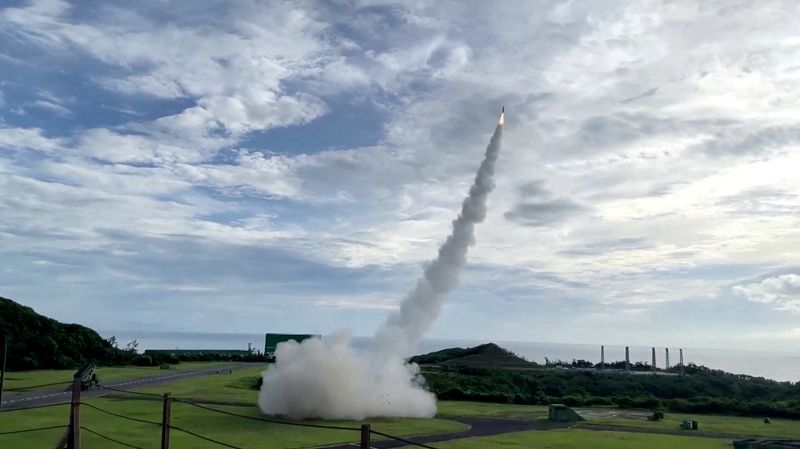By Yimou Lee and Ben Blanchard
TAIPEI (Reuters) - Taiwan's defence spending will rise 7.7% next year, outpacing expected economic growth, the cabinet said on Thursday, as the island adds more fighter jets and missiles to strengthen deterrence against a rising threat from Beijing.
China, which views democratically-governed Taiwan as its own territory, has ramped up military and political pressure over the past five years to assert those claims, which Taipei strongly rejects.
Taiwan's cabinet said following a regular weekly meeting that 2025 defence spending would rise 7.7% year-on-year to T$647 billion ($20.25 billion), accounting for 2.45% of gross domestic product - up from 2.38% this year - and exceeding the government's expectation for economic growth of 3.26% for the year.
The spending includes a special budget worth T$90.4 billion to buy new fighter jets and ramp up missile production. That was part of the military's extra spending worth T$240 billion announced in 2021 over five years.
Hsieh Chi-hsien, head of the defence ministry's comptroller bureau, told reporters defence spending reaching 3% of GDP was a goal they were hoping to reach, and that at the moment Taiwan's defence spending is "growing steadily".
"We will not join in an arms race with other countries. We will increase (spending) steadily according to our needs," he said.
Future spending also depends on whether Taiwan could acquire "key and important" equipment, Hsieh added, without elaborating.
Taiwan's government has made military modernisation a key policy platform and has repeatedly pledged to spend more on its defences given the rising threat from China, including developing made-in-Taiwan submarines.
China's air force flies almost daily missions into the skies near Taiwan, and in May staged war games around the island shortly after President Lai Ching-te took office, a man Beijing brands a "separatist". Lai rejects China's sovereignty claims, saying only Taiwan's people can decide their future.
The budget will still need to be passed by parliament, where the ruling Democratic Progressive Party (DPP) lost its majority in January elections.
Taiwan's main opposition party, the Kuomintang, has repeatedly expressed its support for firming up the island's defences, though it is currently involved in a stand off with the DPP about contested reforms to give parliament greater oversight powers the government says is unconstitutional.
China is also rapidly modernising its armed forces, with new aircraft carriers, stealth fighter jets and missiles.
China in March announced a 7.2% rise in defence spending for this year to 1.67 trillion yuan ($234.10 billion) outpacing the economic growth target of around 5% for 2024, though accounting for only some 1.3% of GDP according to analysts.
Successive U.S. administrations have pushed Taiwan to modernise its military and spend more. The United States is Taiwan's most important arms provider and international backer, despite the absence of diplomatic relations.
Speaking at a security forum in Taipei on Wednesday, Nikki Haley, a United Nations ambassador under the Trump administration, praised Taiwan's commitment to spending more on defence.
"Other free nations should learn from them, especially many U.S. allies," she said.

($1 = 31.9490 Taiwan dollars)
($1 = 7.1338 Chinese yuan renminbi)